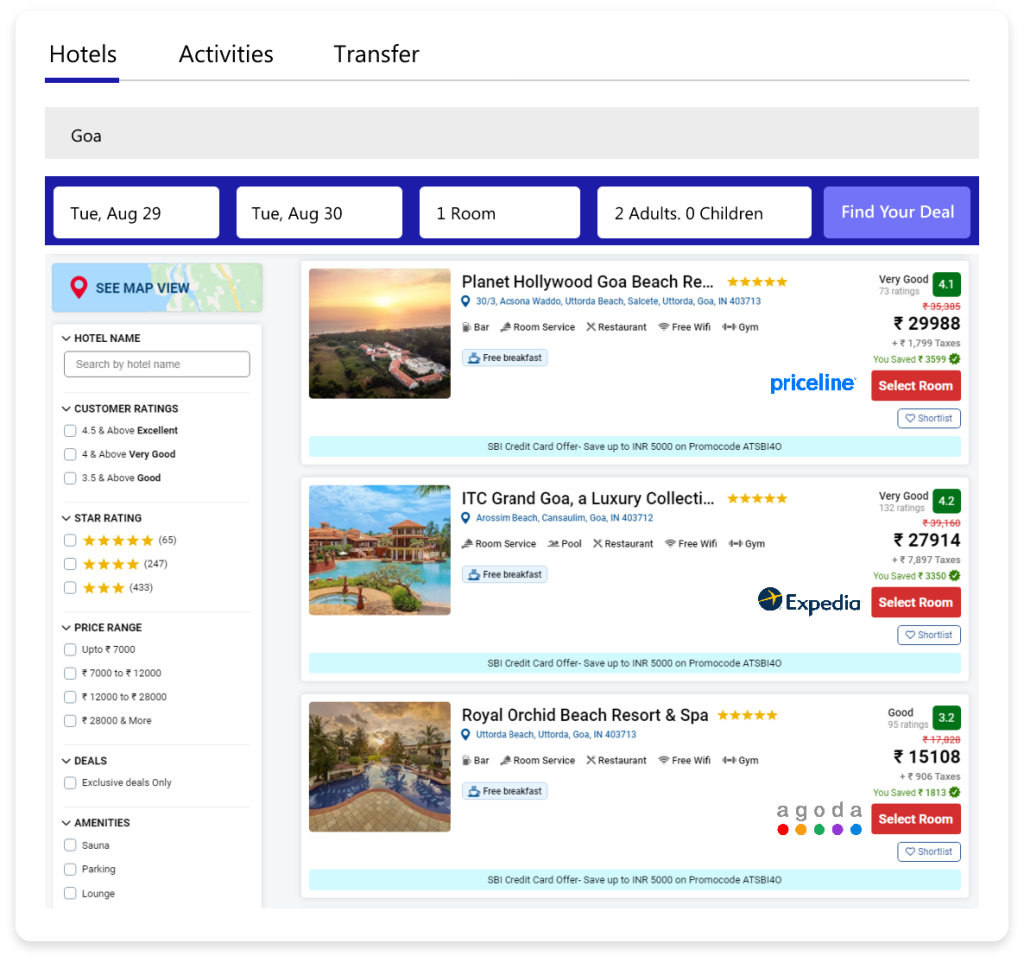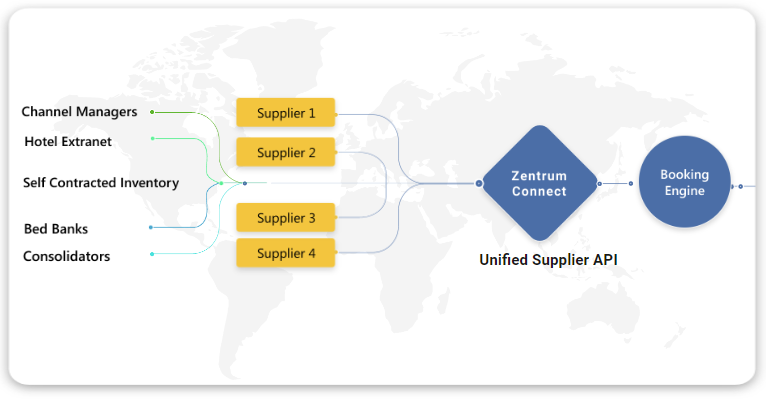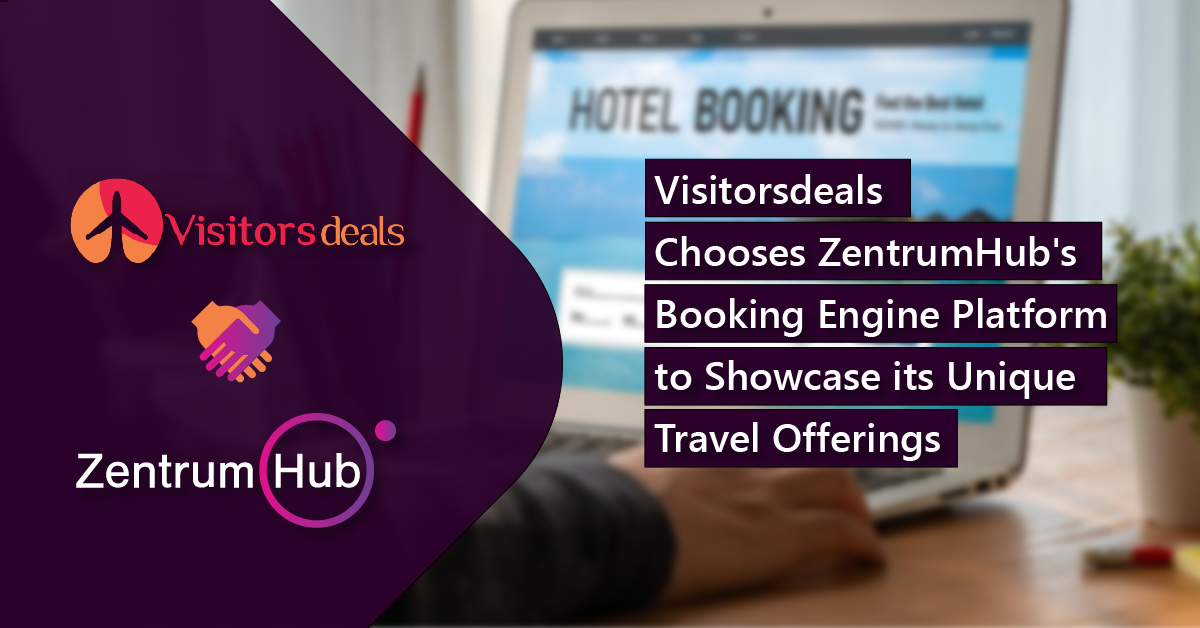Why Do OTAs Need Travel API?
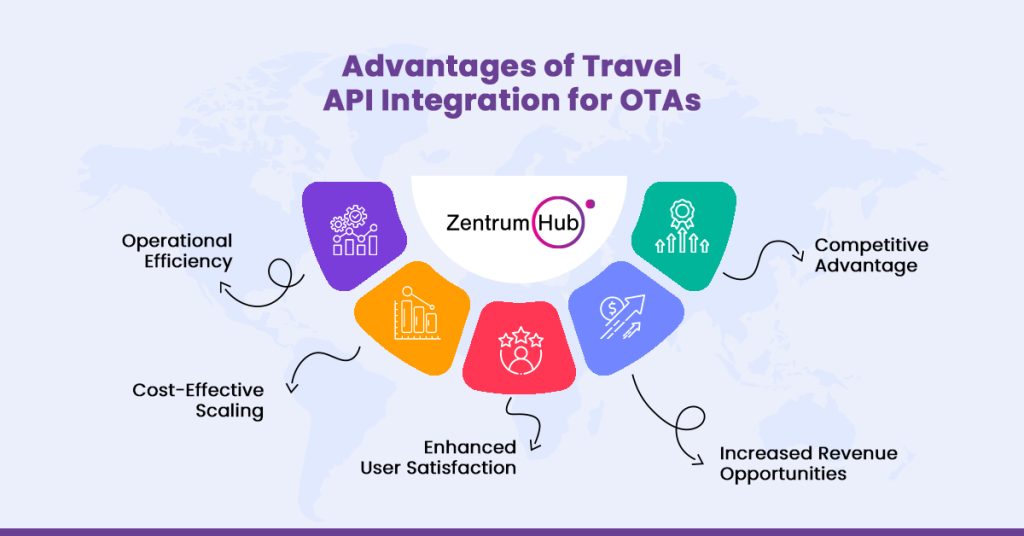
Online Travel Agencies (OTAs) have revolutionized the way travelers book flights, accommodations, and various services related to travel. Instead of requiring customers to navigate multiple sites, OTAs bring everything into a single, user-friendly platform. At the heart of this convenience lies the power of Travel APIs. When integrated various Travel APIs, OTAs can provide real-time information on flight availability, hotel options, rental cars, and more, ensuring seamless and efficient booking experiences for travelers. This blog explores the importance of Travel API integration for OTAs, focusing on the key advantages and types of APIs that contribute to OTAs’ success. The Role of Travel APIs in OTA Functionality A Travel API acts as a bridge between the OTA and various travel service providers, allowing for a two-way data exchange. Through APIs, OTAs can access a vast database of flights, hotels, and other services. Travel APIs pull real-time data from multiple suppliers and display this information on the OTA’s interface, making it easy for customers to find and book their preferred services. Key benefits of Travel APIs for OTAs include: Access to Real-Time Data: With Travel APIs, OTAs offer real-time availability and pricing to users. Automated Booking Processes: APIs enable automated booking without manual intervention, saving time for both travelers and OTAs. Wider Inventory Access: OTAs can provide an extensive range of travel options without holding inventory themselves. Enhanced User Experience: APIs streamline the booking process, improving overall user experience. Types of Travel APIs and Their Importance 1. Hotel Booking API Hotel Booking APIs are essential for OTAs as they enable seamless connections to thousands of hotels worldwide. By integrating a hotel booking API, OTAs offer users access to various hotel options based on location, budget, amenities, and availability. Key Benefits: Wide Selection: Access to a vast range of hotels without holding physical inventory. Dynamic Pricing: Real-time pricing and availability updates, ensuring that the information displayed is current. Personalized Options: Filtering and sorting functions allow users to find accommodations that suit their needs and preferences. For OTAs, hotel booking APIs also eliminate the need for individual partnerships with hotels. Instead, they can connect to a single API and access a broader inventory, saving time and expanding reach. 2. Flight Booking API Another critical component for OTAs is the Flight Booking API. This API enables OTAs to connect with airlines worldwide, providing travelers with up-to-date flight schedules, availability, and pricing. This allows OTAs to compete with traditional airline booking websites, offering customers the same information in one consolidated platform. Key Benefits: Comprehensive Information: API integration brings together schedules, prices, and seat availability from multiple airlines. Booking Flexibility: Customers can book one-way, round-trip, or multi-city flights with ease. Real-Time Updates: Flight information, including delays and cancellations, is updated instantaneously. Increased Revenue Opportunities: OTAs can generate additional revenue by offering various airline options. With a flight booking API, OTAs create a more competitive platform that serves the varied needs of travelers by enabling real-time comparisons across airlines. 3. Car Rental API For travelers who require ground transportation, OTAs can utilize a Car Rental API to provide rental options from companies worldwide. Integrating this API allows OTAs to enhance their service offerings, enabling users to book cars alongside flights and hotels. Key Benefits: Integrated Travel Planning: Users can plan entire trips, including ground transportation, on a single platform. Flexible Options: Availability of different vehicle types and rental durations. Convenience and Time-Saving: Booking cars through OTAs saves users the hassle of going through multiple car rental websites. Car rental APIs help OTAs build a well-rounded platform by catering to diverse transportation needs, ensuring users have everything they need to navigate their destinations with ease. 4. Tour and Activity API An often-overlooked yet essential API for OTAs is the Tour and Activity API. This API connects OTAs to local tour operators, enabling users to book activities such as city tours, excursions, or adventure sports. Key Benefits: Enhanced User Experience: Users can plan their itineraries with activities that suit their interests. Increased Revenue Streams: OTAs can earn commissions on booked tours and activities. Differentiated Offerings: A diverse range of activities sets OTAs apart from competitors. By offering tours and activities alongside accommodations and transportation, OTAs give customers a full-service travel experience, making them the go-to solution for all travel-related bookings. Advantages of Travel API Integration for OTAs Integrating travel APIs provides OTAs with an edge in the competitive travel industry. The most significant benefits include: 1. Improved Operational Efficiency By automating the booking process, Travel APIs reduce the need for manual operations. This leads to reduced operational costs, fewer errors, and faster processing times. Automated bookings and payments also allow OTAs to scale their business without requiring significant investments in customer support or back-end staff. 2. Cost-Effective Scaling Through Travel API integration, OTAs gain access to multiple suppliers without having to maintain direct relationships with each one. They can scale up their inventory at a fraction of the cost, reaching a broader audience and increasing their potential revenue. 3. Enhanced User Satisfaction Providing real-time information and a seamless booking process is critical to retaining customers. When travelers can effortlessly search, compare, and book travel services, they are more likely to return to the platform. APIs ensure OTAs have accurate and up-to-date information, enhancing user satisfaction and loyalty. 4. Increased Revenue Opportunities Travel APIs enable OTAs to introduce various ancillary services—such as flight add-ons, extra baggage options, or car rentals—which can boost revenue. Cross-selling and upselling become easier with the flexibility that APIs provide, allowing OTAs to recommend complementary services during the booking process. 5. Competitive Advantage In a crowded market, offering a comprehensive range of services and real-time data is a major competitive advantage. OTAs that leverage travel APIs can keep up with industry changes and offer personalized solutions that make the platform more attractive to travelers. Implementing Travel API Integration for OTAs The process of integrating travel APIs into an OTA platform involves a few key steps: Selecting the Right APIs: OTAs need to decide on the types of
Travel APIs: The Cost of Integration for OTAs
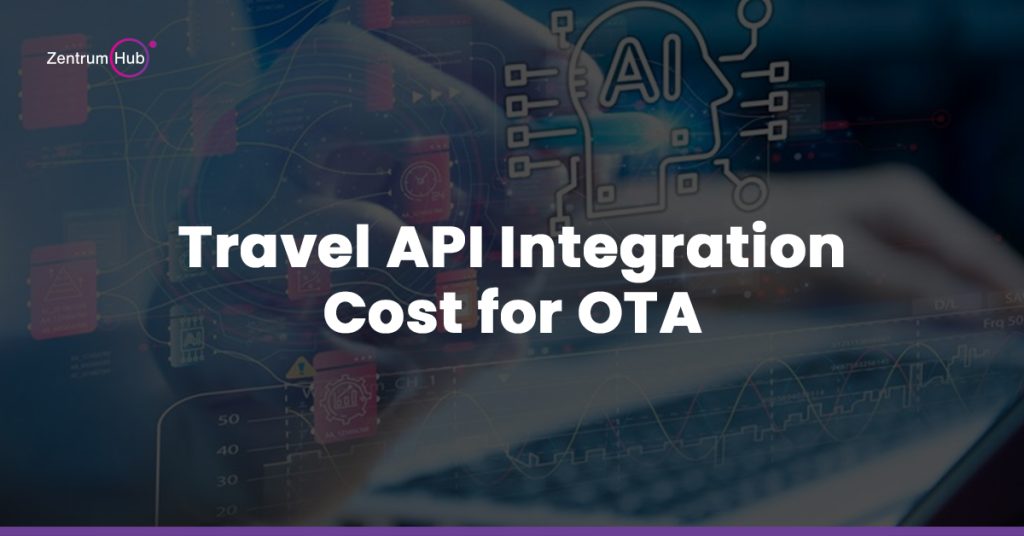
Travel APIs: The Cost of Integration for OTAs With the surge of digital transformation across industries, Online Travel Agencies (OTAs) have become essential platforms for customers seeking hassle-free booking options. A significant component of OTAs’ functionality and seamless user experience hinges on integrating various Travel APIs. These APIs allow OTAs to access and display live information on flights, hotels, car rentals, and other travel-related services. While beneficial, Travel API integration can come with substantial costs and challenges. This blog delves into the types of Travel APIs, their integration costs, and the complexities OTAs face. The Costs Involved in Travel API Integration While integrating Travel APIs brings obvious advantages, it also comes with costs. These costs can vary widely based on the API provider, the complexity of the integration, and the OTA’s specific needs. 1. API Provider Fees Each API provider charges differently, often on a pay-per-use, monthly subscription, or revenue-sharing model. Costs can vary based on: Volume of Requests: The higher the number of API requests, the greater the cost. Many providers offer tiered pricing structures to accommodate different business sizes. API Type: Specialized APIs (e.g., luxury hotel or premium airline APIs) may be more costly due to the exclusivity and quality of the data. Add-On Services: Some providers offer add-ons like customer support, analytics, or premium features at an additional cost. 2. Development and Integration Costs Beyond licensing, integrating APIs requires technical expertise. These costs can include: Developer Costs: Skilled developers are required to integrate, test, and optimize APIs. This is particularly crucial for ensuring that APIs are well-integrated and work seamlessly across the OTA’s platforms. Customization Costs: If APIs need to be tailored to fit specific OTA requirements, customization may increase costs due to the additional development work. Testing and Quality Assurance: Comprehensive testing is necessary to ensure APIs function correctly without disrupting the OTA’s operations. This often involves investing in quality assurance teams and resources. 3. Maintenance and Support API integration is not a one-time cost; ongoing maintenance and support are essential to ensure continuous functionality: Version Updates: APIs are frequently updated to enhance functionality or security. Maintaining compatibility with these updates requires ongoing work. Downtime Management: APIs may occasionally experience downtime, requiring immediate action to minimize disruptions. Many OTAs allocate resources specifically to manage such incidents. Customer Support: APIs require dedicated support to address any technical issues that may arise, and some OTA-specific support teams may work closely with the API providers to troubleshoot as needed. 4. Security and Compliance Costs Since OTAs handle sensitive customer data, API integration must adhere to industry security standards to avoid breaches. Key expenses include: Data Encryption and Security Protocols: Ensuring data security through encryption, firewalls, and intrusion detection systems can be costly but necessary. Compliance Costs: APIs must comply with data protection regulations, such as GDPR, which may require extra investment in legal consultation and monitoring tools. Balancing API Integration Benefits and Costs for OTAs Benefits of Travel API Integration Improved User Experience: Real-time data from APIs allows OTAs to offer a smoother, more engaging customer experience, increasing loyalty and retention. Market Competitiveness: API integration enables OTAs to provide a wide variety of travel services at competitive rates, making them more attractive than smaller or less integrated competitors. Revenue Growth: By offering comprehensive travel packages and a streamlined booking process, OTAs can increase their revenue through higher customer satisfaction and expanded services. Managing and Mitigating Costs Given the high costs, OTAs should adopt strategies to manage and optimize their API integrations effectively: Selective API Usage: Not all APIs are essential for every OTA. Focusing on high-impact APIs can reduce costs while maintaining competitive functionality. Monitoring Usage and Limiting Requests: Regular monitoring of API usage can help avoid unnecessary data calls, keeping costs in check. Using Third-Party Platforms: Some third-party platforms consolidate multiple API providers, offering bundled packages that can reduce expenses and simplify integration. Also Read Travel API Comparison: 8 Factors for Selecting the Best One Challenges in Travel API Integration for OTAs Even with the best planning, integrating APIs comes with challenges that can impact both cost and functionality. 1. Data Consistency and Synchronization Issues When OTAs integrate multiple APIs from different providers, inconsistencies can arise due to data formatting differences. Synchronizing this data accurately across platforms can be complex and time-consuming. 2. Latency and Performance Issues APIs may occasionally cause latency, particularly if the OTA relies on multiple, high-traffic APIs simultaneously. This can slow down the booking process, negatively affecting the user experience and reducing conversions. 3. Dependence on Third-Party Providers Reliance on external API providers can make OTAs vulnerable to service disruptions. If an API provider experiences downtime or terminates its services, it can disrupt the OTA’s offerings, leading to revenue losses. 4. Security and Privacy Risks As OTAs handle customer data, integrating third-party APIs introduces risks of data breaches. Providers must ensure API security and compliance with industry regulations, which may add complexity and cost. Want to Learn More? Check Out These Hotel API Blogs Travel API Comparison: 8 Factors for Selecting the Best One Why Do OTAs Need Travel API? Travel APIs: The Cost of Integration for OTAs Travel API Integration: Types, Pricing, Benefits & Timeline How Can Startups and OTAs Maximize Revenue with Hotel Booking APIs? How to Optimize Your Platform with Hotel API Integration? Complete Guide to Hotel API Integration: Costs, Benefits, Technical Challenges in Hotel API Integration and How to Overcome Them How to Choose the Best Hotel API Provider? Key Features to Evaluate Hotel API Integration Costs: Pricing Methods for OTAs Explained What is the Difference Between B2C and B2B Hotel Booking API? Role of Hotel Booking APIs in Hotel Booking Engine? Conclusion Travel API integration is essential for OTAs to deliver a competitive, comprehensive travel experience to users. However, the costs of API integration—ranging from licensing fees to maintenance and security expenses—can be substantial. While these costs are often necessary investments to meet customer expectations and industry standards, strategic management can help balance expenses and benefits. As technology
Travel API Integration: Types, Pricing, Benefits & Timeline
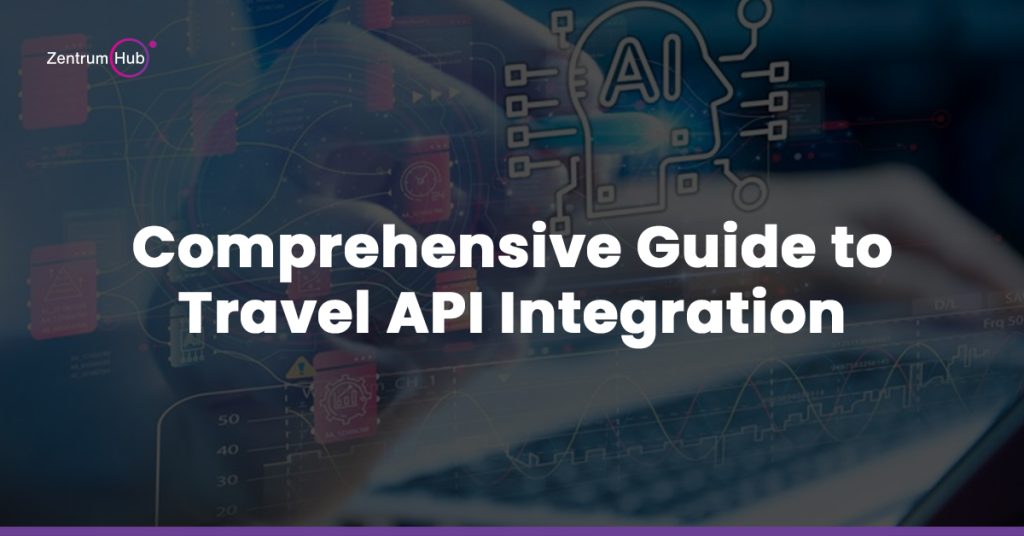
Travel API Integration: Types, Pricing, Benefits & Timeline If you’re in the travel industry, you understand how crucial it is to offer seamless booking services. Travel API integration has become a game-changer for businesses looking to provide real-time access to flights, hotels, car rentals, and other services. Whether you’re an established travel agency, an online platform, or a startup, integrating with travel APIs allows you to expand your offerings without building everything from scratch. This guide dives deep into the essential aspects of Travel API integration, including pricing models, costs, timelines, and optimization strategies. By the end of this guide, you’ll have a clear understanding of how to approach API integration effectively and what to expect at every stage. Let’s explore how Travel APIs can elevate your travel business. What is Travel API Integration? At its core, travel API integration is the process of connecting third-party travel services (flights, hotels, car rentals, etc.) into your platform via Application Programming Interfaces (APIs). APIs act as communication bridges between different systems, allowing your platform to offer external services without directly managing inventory or building those services in-house. By integrating with travel APIs, you can provide users with real-time information on availability, prices, and bookings, all without needing to maintain separate agreements with multiple suppliers. Instead, you tap into a centralized network of suppliers through their APIs. Types of Travel APIs Flight Booking APIs: Offer real-time data on flight availability, schedules, and pricing from multiple airlines. Hotel Booking APIs: Enable customers to search for rooms, check availability, view room types, and book stays at various hotels. Car Rental APIs: Provide access to real-time car rental availability, pricing, and booking services from rental agencies. Tour & Activity APIs: Integrate local tours, activities, and experiences that travelers can book during their trips. Benefits of Travel API Integration Real-time Information: APIs offer up-to-the-minute availability and pricing updates, keeping your platform dynamic. Broader Inventory: APIs let you offer a wider range of travel services without managing the inventory yourself. Faster Time to Market: By leveraging third-party APIs, you avoid building services from the ground up, speeding up your platform’s development. Cost Savings: Developing an in-house solution to manage global flight schedules, hotel room availability, or car rentals would be prohibitively expensive and time-consuming. APIs provide a cost-effective alternative. Improved User Experience: Offering seamless bookings and a comprehensive range of services improves customer satisfaction, leading to higher retention rates. Pricing Methods for Travel API Integration When planning to integrate travel APIs, one of the most important considerations is pricing. Travel API providers often offer several pricing models based on usage, volume, and services offered. It’s essential to choose the right pricing model for your business to avoid unexpected costs or underutilizing the API’s capabilities. Subscription-Based Pricing Subscription pricing is one of the most straightforward models. The API provider charges a flat fee, either monthly or annually, based on your usage. Typically, this fee includes access to a certain number of API requests, with additional charges for requests that exceed the set limit. Pros: Subscription-based pricing offers predictability, allowing businesses to budget more accurately. Cons: For businesses with fluctuating or seasonal demand, subscription models may lead to under-utilization, where you end up paying for more than you use. Example: A hotel booking API might charge $1,000 per month for up to 20,000 API requests. If you exceed that limit, you might move to the next tier, costing $2,500 for 50,000 requests. Pay-Per-Transaction Pricing Pay-per-transaction models charge you for each completed booking or transaction processed through the API. This model can be beneficial for smaller travel businesses that may not have consistent traffic. Pros: Ideal for companies with lower or irregular traffic volumes as you only pay for successful bookings. Cons: Costs can escalate quickly if your business grows, and this model might become less cost-effective over time. Example: A flight booking API may charge $2 per booking. If your platform processes 1,000 bookings per month, your API costs will be $2,000. Revenue Sharing Model In a revenue-sharing model, the API provider takes a percentage of each booking’s revenue. This model works well for startups or platforms that have low initial booking volumes, as it eliminates high upfront costs. Pros: Little or no upfront costs; good for startups. Cons: You lose a portion of your revenue, which can become significant as your business scales. Example: A car rental API might take 5% of each rental’s revenue. If your platform generates $200,000 in monthly car rental bookings, you would owe $10,000 in revenue sharing. Freemium Model In the freemium model, the API provider offers basic access for free, often with limited features or a cap on the number of API requests. More advanced features or higher limits require a paid plan. Pros: A low-risk way to start using an API, allowing you to test it before committing to paid plans. Cons: The free tier might have strict limitations, making it less suitable for growing businesses. Example: An activity booking API might offer free access for up to 1,000 API requests per month. After that, you might need to upgrade to a plan costing $500 per month for 10,000 requests. How Does Travel API Integration Improve My Booking Process? The cost of integrating travel APIs goes beyond the pricing model of the API itself. When budgeting, you need to account for several factors including setup fees, development costs, and ongoing maintenance. Setup and Licensing Costs Some API providers charge an initial setup fee, which covers the cost of integrating the API into your platform. These fees can range from a few hundred dollars to several thousand, depending on the complexity of the API and the level of support required during the integration process. Average Setup Costs: $500 – $10,000 Additionally, some providers may charge licensing fees, especially if they offer exclusive access to certain types of travel inventory. Licensing costs are often built into monthly or annual subscription fees, but in some cases, they may be separate. Development and Integration Costs
How Can Startups and OTAs Maximize Revenue with Hotel Booking APIs
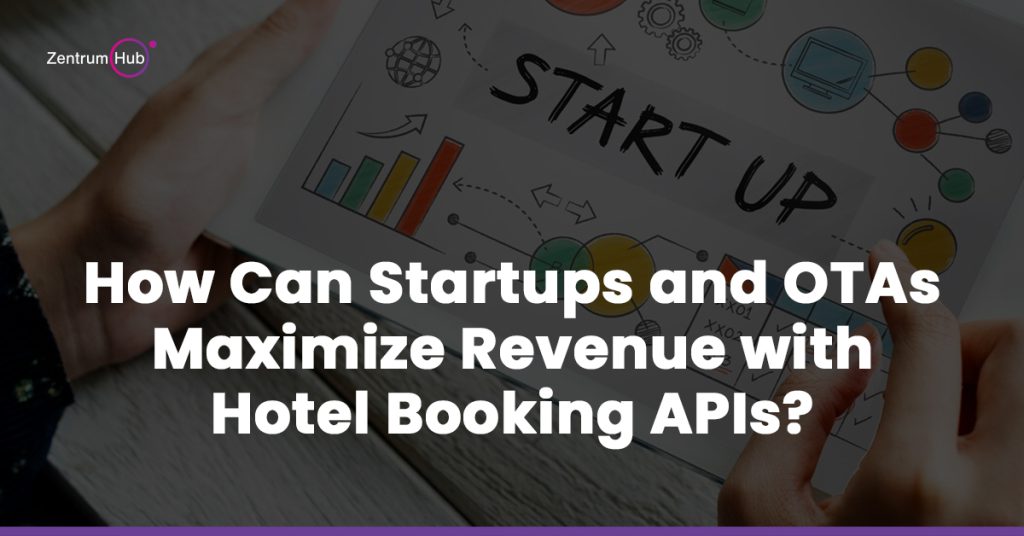
How Can Startups and OTAs Maximize Revenue with Hotel Booking APIs? For travel startups and Online Travel Agencies (OTAs), the key to sustained growth and higher revenue lies in leveraging the right technology—specifically, hotel booking APIs. These powerful tools are no longer just about simplifying the booking process. They represent untapped revenue potential, offering travel businesses opportunities to expand hotel inventory, personalize user experiences, and automate complex pricing models. The focus isn’t merely on adding more hotels to your system. It’s about creating unique value for customers, optimizing backend processes, and opening new streams of income that would otherwise remain dormant. Here’s how you can maximize your revenue using hotel booking APIs effectively. Expanding Inventory: The Power of Multiple API Integrations One of the most significant advantages of integrating a hotel booking API is the ability to increase your available hotel inventory. Travel startups often struggle with limited hotel options, and this can negatively affect both user experience and conversion rates. By integrating multiple hotel APIs from various providers, you can offer a more diverse range of hotels, locations, and room types, which in turn drives more bookings. Broader Reach: Expanding your inventory with a global hotel API provider, such as Amadeus or Travelport, allows you to offer properties across different price ranges, catering to budget-conscious travelers and luxury seekers alike. Access to Unique Listings: Many hotel APIs provide access to boutique hotels, vacation rentals, and exclusive deals that aren’t available through more traditional booking systems. This gives your platform a competitive edge, as users can find properties they wouldn’t get elsewhere. Increased Conversion Rates: Offering a broader selection means users are more likely to find the perfect accommodation, reducing cart abandonment and boosting completed bookings. The more options they have, the less likely they are to leave your site to book elsewhere. Personalizing the Booking Experience Through APIs In the age of personalization, users expect tailored recommendations and seamless search experiences. Hotel booking APIs can significantly improve the way you deliver personalized results to your customers, thereby enhancing satisfaction and increasing revenue. Filtering by Preferences: APIs like Booking.com’s API allow for advanced search filtering, helping users find hotels based on specific preferences like amenities, proximity to landmarks, or guest ratings. The more relevant your suggestions are to users, the higher the chances of a booking. Customized Pricing and Offers: Hotel booking APIs provide real-time data on pricing, availability, and even last-minute deals. Using this data, you can offer dynamic pricing models that present personalized offers based on user behavior, travel history, or even seasonal trends. Recommendation Engines: By utilizing data from API integration, you can build recommendation engines that show users hotels similar to their past bookings or properties that suit their travel style. This level of personalization increases both trust and loyalty, encouraging repeat business. Utilizing Dynamic Pricing for Revenue Growth Dynamic pricing is a game-changer in the hotel industry, allowing OTAs and startups to automatically adjust hotel rates based on real-time factors like demand, occupancy, and even competitor pricing. Hotel APIs are at the core of this strategy, as they provide constant access to updated pricing data. Real-Time Pricing Updates: With a robust API integration from providers like Hotelbeds, you can access real-time price fluctuations and ensure your platform always offers the most competitive rates. This not only helps avoid losing bookings to competitors but also maximizes profit margins by adjusting prices based on demand. Price Comparison Tools: Integrating a price comparison feature into your website, using API data, can be a great way to help customers see the value in booking through your platform. These tools automatically show customers that your rates are competitive, driving higher conversion rates. Smart Inventory Management: APIs help manage your hotel inventory effectively by showing which rooms or hotels are in high demand, allowing you to prioritize premium listings. Additionally, the ability to display flexible cancellation policies or limited-time offers, based on API data, can also increase booking frequency. Streamlining Operations with API Automation A key revenue-generating aspect of API integration is the automation it enables behind the scenes. This goes beyond just facilitating bookings. It improves operational efficiency, reduces costs, and allows you to scale your business more easily. Automating Customer Service: Chatbots and virtual assistants integrated with hotel APIs can automate common customer service inquiries related to bookings, cancellations, and changes. This reduces the need for extensive customer support teams, cutting costs while maintaining service quality. Simplifying Payments: By integrating APIs with payment gateways, you can streamline the payment process for both the customer and the hotel. Some hotel booking APIs offer built-in payment processing, reducing manual intervention and minimizing the risk of errors in payment reconciliation. Revenue Optimization: APIs offer access to detailed reports and analytics. Understanding user trends, popular booking periods, and hotel demand spikes can help in making more informed business decisions, optimizing both inventory and pricing for peak profitability. Success Stories of OTAs Using Hotel Booking APIs Let’s take a look at some real-world examples of how OTAs have successfully used hotel booking APIs to boost revenue: Expedia: As one of the largest OTAs in the world, Expedia leverages multiple hotel APIs to offer a vast inventory of accommodations, from budget options to luxury hotels. The company also uses real-time data and dynamic pricing to ensure customers are getting the best possible rates. Skyscanner: Skyscanner has integrated APIs from various hotel API providers, such as Hotelbeds and Priceline, to offer users a comprehensive comparison tool. Their API-driven platform not only makes it easier for users to find hotels but also increases the likelihood of conversion by offering the best available rates. Airbnb’s API Expansion: Although initially focused on vacation rentals, Airbnb’s integration with third-party hotel APIs allowed it to expand its offering and tap into the hotel booking market, significantly increasing its revenue streams. Want to Learn More? Check Out These Hotel API Blogs Travel API Comparison: 8 Factors for Selecting the Best One Why Do OTAs Need Travel API? Travel APIs: The
How to Optimize Your Platform with Hotel API Integration?

How to Optimize Your Platform with Hotel API Integration? In today’s digital age, travel platforms need to provide comprehensive, seamless booking experiences to stay competitive. Integrating Hotel APIs (Application Programming Interfaces) is one of the most powerful ways to enhance your platform’s functionality. Whether you are running a travel website, app, or OTA (Online Travel Agency), hotel API integration can boost efficiency, increase inventory, and deliver a personalized customer experience. This blog will explore how you can optimize your platform through hotel API integration, from choosing the right API to leveraging advanced features that drive growth. Understanding Hotel API Integration Hotel API integration allows platforms to connect directly with hotel booking systems, inventory databases, and third-party hotel aggregators. This enables seamless data exchange, allowing your platform to access live information on hotel availability, pricing, room types, and booking capabilities. APIs work by sending and receiving data through standard protocols like REST or SOAP. When integrated correctly, hotel APIs act as bridges between your platform and multiple hotel suppliers, consolidating data to offer your users a comprehensive range of hotel options without leaving your site or app. Moreover, APIs allow for real-time updates, meaning your users can view the latest prices and availabilities, reducing booking errors and cancellations. This technical integration becomes critical as users today expect accuracy, speed, and convenience when booking travel accommodations. What are the Benefits of Hotel API Integration? Hotel API integration goes beyond offering more hotels to your users. Here’s how it can significantly enhance your platform: a. Expanded Inventory By integrating with multiple APIs, you can access a global inventory of hotels, from major chains to independent boutique properties. This diversity enhances user choice, keeping them on your platform rather than pushing them to competitors with more options. b. Real-time Data Synchronization Hotel APIs ensure that the information on your platform is up-to-date. Real-time data prevents situations where users book unavailable rooms, improving user experience and minimizing cancellations. c. Personalized User Experience Through advanced filtering features, APIs allow you to offer personalized recommendations based on user preferences, history, and behavior. This level of customization is essential in today’s market, where users expect tailored suggestions. d. Automated Booking Processes With API integration, your platform can automate booking confirmations, payments, cancellations, and amendments. Automating these processes not only improves efficiency but also reduces the burden on customer support teams. e. Reduced Development Time Instead of building everything from scratch, integrating hotel APIs allows you to deploy new features faster. This approach ensures quicker time-to-market for new services and functionality. f. Increased Revenue With a broader inventory and personalized offerings, users are more likely to complete bookings, which directly translates into higher conversion rates and revenue for your platform. Dynamic pricing models and access to exclusive deals via APIs can also help boost profit margins. Also Read Hotel API Integration Costs: Pricing Methods for OTAs Explained Key Considerations Before Integrating Hotel APIs Before diving into API integration, several critical factors must be evaluated to ensure that the integration adds value rather than complexity: a. API Documentation Good API documentation is the backbone of any successful integration. Ensure that the provider offers comprehensive, easy-to-understand documentation that covers all endpoints, authentication methods, and error handling techniques. b. Rate Limiting Every API has a rate limit, which controls how many requests can be made within a specific timeframe. Understanding these limits is crucial, as exceeding them could lead to downtime or blocked requests during peak times. Choose a provider that offers flexible rate limits and scalable options as your platform grows. c. Latency and Performance Hotel APIs should be fast and reliable. High latency can negatively affect user experience, especially in regions where internet speeds are slower. Test the API’s performance across different geographical regions to ensure consistent user experience. d. Data Security As you handle sensitive customer information such as payment details and personal data, security should be a top priority. Verify that the API provider follows industry-standard encryption practices (like SSL/TLS), is GDPR-compliant, and has measures in place to prevent data breaches. e. API Support and Maintenance Ensure that your API provider offers strong technical support and regular updates. APIs evolve, and regular maintenance is essential to fix bugs, improve performance, and ensure compatibility with other services. Choose a provider that offers timely updates and responsive customer support in case issues arise. f. Scalability As your platform grows, the demand on your APIs will increase. Select a hotel API provider with scalable solutions that can grow alongside your platform without sacrificing performance or reliability. Also Read Travel APIs: The Cost of Integration for OTAs How to Choose the Right Hotel API Provider? Selecting the right API provider can be overwhelming with so many options on the market. Here are some key factors to keep in mind when making your choice: a. Inventory Size and Variety Consider the size and variety of the hotel inventory. Some APIs specialize in specific regions or types of accommodations, such as luxury hotels, boutique stays, or budget-friendly options. Make sure that the provider’s inventory aligns with your target market and user expectations. b. Pricing Model API providers offer different pricing models—some charge per API call, while others charge a flat fee or take a commission per booking. Understand how these models will affect your revenue and costs, especially as your platform scales. Look for transparent pricing structures without hidden fees. c. Partnerships and Affiliations Top API providers often have partnerships with major hotel chains and distribution systems (e.g., Amadeus, Sabre). These partnerships can result in exclusive deals or more extensive coverage. Evaluate the provider’s affiliations to ensure access to high-quality inventory and competitive rates. d. Ease of Integration Check whether the API is easy to integrate with your existing system. Some APIs require extensive customization, while others offer plug-and-play functionality. Choose a provider with simple integration procedures and available SDKs (Software Development Kits) for faster deployment. e. Reputation and Reviews Don’t just rely on the provider’s sales pitch—check out reviews, case studies, and
Everything You Need to Know About QTM Qatar 2024
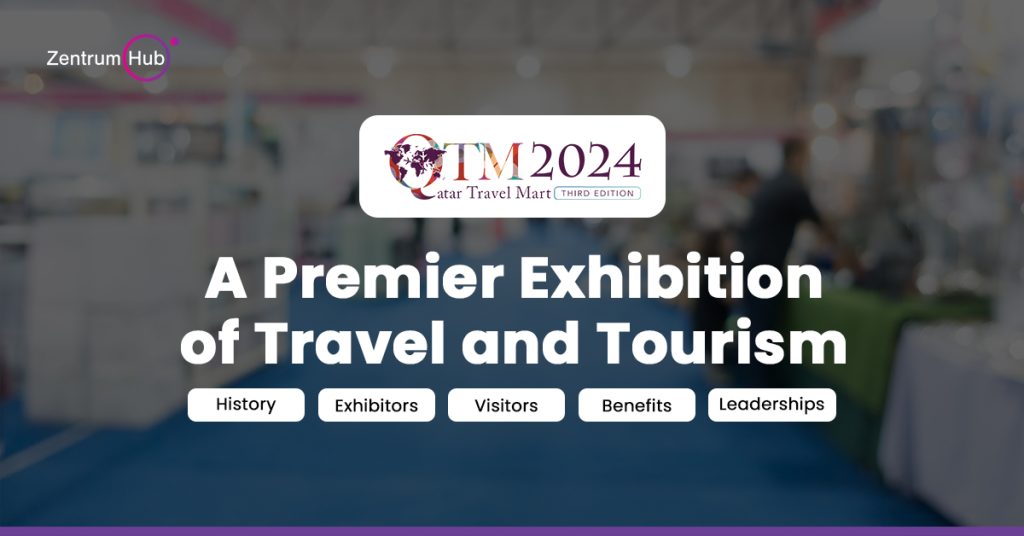
Everything You Need to Know About QTM Qatar 2024 Qatar has increasingly become a global hub for innovation, culture, and economic growth. The country’s growing prominence is reflected in its tourism sector, with major international events such as the Qatar Travel Mart (QTM) playing a crucial role in positioning Qatar as a leading destination for travel and hospitality. QTM Qatar 2024 is set to be a milestone event, gathering industry experts, exhibitors, and visitors from around the world. With its focus on travel trends, sustainability, and technological advancements, QTM is an essential event for anyone invested in the future of global tourism. In this blog, we will explore the history of QTM, provide details about the upcoming 2024 event, explain how exhibitors and visitors can register, outline the benefits of attending, and conclude with why QTM Qatar 2024 is a must-attend event for industry professionals. History of the Event QTM Qatar is relatively young but rapidly growing. Since its inception, QTM has quickly established itself as one of the most important events in the Middle East for travel, tourism, and hospitality professionals. The first edition of QTM was launched in 2021 with the aim of transforming Qatar into a premier international tourist destination, aligning with Qatar National Vision 2030. This national framework emphasizes the importance of economic diversification, cultural enrichment, and sustainable development. Historically, QTM was conceived as a platform that brings together global tourism stakeholders, allowing them to showcase products, services, and innovations. This also aligns with Qatar’s focus on sports tourism and business travel, especially with the successful hosting of global events like the FIFA World Cup 2022. Over the years, the event has grown in terms of both the number of exhibitors and attendees, attracting key players from the travel, tourism, hospitality, and technology sectors. QTM is not just an exhibition—it’s a gateway to knowledge, providing a platform for business networking, learning about the latest trends, and fostering international collaborations. Each edition of QTM aims to build on the success of previous years, offering new opportunities for growth and innovation. This evolution has helped the event cement its status as a key meeting point for tourism professionals globally. Details Regarding the 2024 Event QTM Qatar 2024 is shaping up to be the most significant edition yet, with a broader range of exhibitors, speakers, and interactive activities that promise to keep attendees engaged throughout the event. Event Date and Venue QTM Qatar 2024 will take place from November 18-20, 2024, at the Doha Exhibition and Convention Center (DECC), a state-of-the-art venue located in the heart of Qatar’s capital city. The DECC is known for hosting some of the largest and most prestigious events in the region, providing a central location for both international and domestic participants. Exhibitors This year’s edition of QTM will feature more than 300 exhibitors from around the world, representing various sectors including: Tourism and Travel: Airlines, destination management companies, tour operators, and cruise lines. Hospitality: Major hotel chains, resorts, boutique accommodations, and luxury villas. Travel Technology: Companies providing innovative solutions like travel booking platforms, virtual reality experiences, AI-driven travel services, and mobile applications for seamless travel. Sustainability: Organizations focused on eco-friendly tourism, offering products and services that align with sustainable travel goals. Exhibitors at QTM Qatar 2024 will have access to a highly targeted audience, allowing them to present their latest products and services, conduct business meetings, and network with potential partners and clients. Additionally, there will be opportunities to participate in product launches, live demonstrations, and sector-specific panels. Key Focus Areas QTM Qatar 2024 will focus on emerging trends and key areas of interest in the travel and tourism industry. These include: Luxury Travel: As the global demand for luxury experiences rises, QTM will highlight exclusive travel packages, high-end hotels, and unique destination experiences. Sports Tourism: Qatar’s success with the FIFA World Cup has positioned it as a leader in sports tourism. QTM will feature companies offering travel experiences centered around major sporting events. Medical Tourism: Healthcare travel has become a significant part of Qatar’s tourism offering. Exhibitors will showcase services related to medical and wellness tourism, from hospitals and clinics to wellness retreats. Sustainable Travel: Given the increasing importance of sustainability, QTM will feature a special focus on eco-friendly travel products and services, promoting the importance of responsible tourism. Seminars, Workshops, and Networking The 2024 event will host keynote speeches by industry leaders, workshops on new technologies and practices, and panel discussions on the future of travel and tourism. These sessions will be led by global experts and will provide attendees with deep insights into the challenges and opportunities within the travel sector. Networking opportunities will also be abundant. Dedicated networking lounges and business matchmaking services will help exhibitors and visitors connect, enabling collaborations that can lead to business growth and innovation. Invite Links for Exhibitors and Visitors Registration Attendees and exhibitors can register for QTM Qatar 2024 through the following links: Exhibitor Registration: Click here to register as an exhibitor Visitor Registration: Click here to register as a visitor Exhibitor Benefits Exhibitors gain numerous advantages by participating in QTM Qatar 2024: Global Exposure: Over 20,000 visitors expected. You as exhibitors can showcase your brand to an international audience. Product Launches: The exhibition serves as a prime platform for launching new products and innovations. Networking: Attendees include decision-makers and key stakeholders, providing exhibitors the opportunity to form valuable business connections. Visitor Benefits Visitors to QTM Qatar 2024 will benefit from: Industry Insights: Visitors will have access to the latest travel trends, product launches, and expert opinions during seminars and workshops. Exclusive Offers: Many exhibitors provide special deals and offers exclusively for event attendees. Access to Innovations: Stay up to date with cutting-edge travel technologies, such as AI-driven booking systems, virtual tours, and more. Benefits of Attending QTM Qatar 2024 QTM Qatar 2024 offers a wide range of benefits for both exhibitors and visitors: a) For Exhibitors International Exposure: Exhibitors will have the opportunity to reach thousands of potential clients and business
Everything You Need to Know About Phocuswright Arizona 2024

Everything You Need to Know About Phocuswright Arizona 2024 Phocuswright Arizona 2024 is a premier event for travel and technology professionals, scheduled from November 18-21 in Phoenix, Arizona. This conference offers a platform for networking, exploring new innovations, and gaining insights from industry experts. The event will focus on the future of travel technology, with highlights such as the Innovation Summit, workshops, and panel discussions featuring CEOs and thought leaders. Attendees can also discover emerging trends in AI, sustainable travel, and customer experience. Whether you’re an exhibitor or attendee, this is a must-attend event for those looking to stay ahead in the evolving travel industry. For over two decades, Phocuswright has been at the forefront of helping travel professionals navigate these changes through its research, insights, and world-renowned events. The annual Phocuswright Conference is a cornerstone of the travel and tourism calendar, drawing thousands of attendees to discuss the future of travel, learn from industry leaders, and foster valuable connections. In 2024, the Phocuswright Conference will take place in Phoenix, Arizona, from November 18 to November 21, 2024. As always, the event promises an exciting lineup of speakers, exhibitors, and workshops, all aimed at shaping the future of the travel industry. Whether you’re a travel tech startup, an established business, or an investor, this event offers a unique opportunity to stay ahead of the curve. In this blog, we’ll explore the history of Phocuswright, dive into the details of the 2024 event, and discuss the benefits of attending. We’ll also provide you with the necessary registration links and other essential information to ensure you don’t miss out. History of Phocuswright Founded in 1994 by Philip Wolf, Phocuswright was created to provide research and insights into the travel industry, with a focus on the role of technology in transforming the sector. At the time, the internet was beginning to change how consumers booked travel, and Phocuswright emerged as a key player in analyzing these trends and forecasting future developments. Over the years, the Phocuswright Conference has grown from a small gathering to one of the most important events in the global travel industry. With a focus on innovation, disruption, and the impact of emerging technologies, it has become a platform for companies, thought leaders, and investors to collaborate and push the boundaries of what’s possible in travel. Phocuswright’s history is marked by its commitment to staying ahead of the curve. It was one of the first organizations to focus on online travel booking, and in recent years, it has explored topics such as artificial intelligence, blockchain, and sustainable travel. Each year, the conference evolves to address the most pressing issues and opportunities facing industry, making it a must-attend event for anyone involved in travel and tourism. Details of the Phocuswright Arizona 2024 Event Phocuswright Arizona 2024 is set to be one of the most exciting events yet. The conference will be held at the JW Marriott Phoenix Desert Ridge Resort & Spa, a luxurious venue that will provide the perfect backdrop for networking, learning, and showcasing new innovations. Key Details: Date: November 18-21, 2024 Location: JW Marriott Phoenix Desert Ridge Resort & Spa, Phoenix, Arizona Theme: “Shaping the Future of Travel Technology” This year’s theme focuses on the transformative power of technology in travel, particularly how artificial intelligence (AI), machine learning, and data analytics are reshaping the way we travel. Sessions will delve into the integration of emerging technologies to enhance the customer experience, streamline operations, and create more sustainable travel options. Event Highlights: Keynote Speakers: Phocuswright always attracts an impressive lineup of speakers, and 2024 will be no different. Expect to hear from CEOs, founders, and industry thought leaders who will share their insights on where the industry is headed. Innovation Summit: This showcase will feature the most promising startups in travel tech, giving them a platform to pitch their ideas to investors, industry experts, and the press. Previous Innovation Summits have introduced breakthrough companies that have gone on to become major players in the travel industry. Workshops and Panels: Attendees will have the chance to participate in interactive workshops and panel discussions, covering topics such as sustainability, AI-driven personalization, digital transformation, and the future of travel marketing. Networking Sessions: One of the key draws of the Phocuswright Conference is the opportunity to network with other professionals. The 2024 event will include dedicated networking sessions where attendees can connect with industry leaders, investors, and innovators. Who Should Attend? Travel and Hospitality Professionals: Hoteliers, airline executives, tour operators, and more will benefit from discussions on the latest industry trends. Technology Innovators: Companies developing solutions for the travel industry can gain exposure and learn about the latest advancements in travel tech. Investors: With so many startups in attendance, investors will have a chance to discover the next big thing in travel technology. Marketing and Strategy Executives: Learn how new tools and platforms are driving customer engagement and loyalty in travel. Registration Links for Exhibitors and Visitors Registration for Phocuswright Arizona 2024 is now open, and there are opportunities for both exhibitors and attendees. Exhibitor Registration: If you’re a company in the travel industry, particularly in the tech space, the Phocuswright Exhibition is an excellent opportunity to showcase your products and services. Exhibitors will have a dedicated space to engage with attendees, demonstrate their solutions, and form strategic partnerships. Exhibitor Registration Link Visitor Registration: For attendees, the Phocuswright Conference is the ultimate networking and learning experience. Whether you’re interested in the latest trends in travel tech or looking to form partnerships, this is the place to be. Visitor Registration Link Early Bird Pricing is available for both exhibitors and attendees until September 30, 2024, so be sure to register soon to take advantage of the discount! Benefits of Attending Phocuswright Arizona 2024 Attending Phocuswright Arizona 2024 offers a wealth of benefits, regardless of your role in the travel or tech industry. Here are some of the top reasons to attend: 1. Industry Insights Phocuswright is renowned for its data-driven research and market
Everything You Need to Know About WTM London 2024

Everything You Need to Know About WTM London 2024 Online Travel Agencies (OTAs) face several challenges in a competitive market. Price competition pressures OTAs to offer low prices, reducing profit margins. Managing real-time inventory, high customer acquisition costs, and ensuring secure payments add further complexity. Retaining customers is difficult due to low brand loyalty, while seamless integration with suppliers requires sophisticated technology. Additionally, OTAs must handle frequent cancellations, keep pace with technological advancements, and navigate global expansion challenges like localization. Finally, delivering personalized user experiences at a scale remains crucial but difficult. Overcoming these challenges requires innovative solutions, advanced technology, and strategic supplier partnerships to remain competitive and profitable. World Travel Market (WTM) London, one of the most influential events in the global travel industry, is set to return from November 5-7, 2024 at ExCeL London. Celebrating its long history as a premier platform for professionals in travel and tourism, WTM London has evolved into a critical space for networking, showcasing innovative products, and fostering partnerships across the globe. In this blog, we’ll explore the history of WTM London, where to exhibit in 2024, and what visitors can expect from this monumental event. History of WTM London WTM London first opened its doors in 1980, aiming to bring together tourism professionals from various sectors around the world. Over the years, the event has grown in size and prestige, attracting thousands of exhibitors and tens of thousands of visitors annually. Initially launched as a modest platform to boost the travel industry, it quickly evolved into a global event attended by stakeholders from over 180 countries. The purpose of WTM London has always been to create business opportunities by connecting travel buyers and sellers, but its role in shaping trends and strategies in the industry has expanded significantly. The event now highlights important industry issues like sustainable tourism, technological innovation, and responsible travel practices. WTM London’s continuous emphasis on thought leadership, bolstered by panels and workshops, has contributed to its enduring reputation as a driving force in travel and tourism. Where to Exhibit at WTM London 2024? Exhibiting at WTM London is a powerful way to position your brand in front of a global audience of travel professionals, from senior buyers to media representatives. The 2024 event will offer exhibitors the chance to showcase products, build partnerships, and conduct business in an environment designed for networking. Benefits of Exhibiting Exhibitors at WTM London benefit from direct access to key decision-makers in the industry. WTM meticulously pre-selects buyers, ensuring that exhibitors engage with professionals with genuine purchasing power. In 2023, over 29,000 pre-scheduled meetings took place, providing exhibitors with a unique opportunity to generate meaningful leads and close deals. With around 50% of buyer contracts signed on-site, the potential for business at WTM London is unparalleled. Key benefits for exhibitors include: Global Exposure: Reach an audience spanning 184 countries. Pre-vetted Buyers: Connect with over 5,000 senior buyers with purchasing authority. Networking Opportunities: Meet with top industry professionals and build long-term partnerships. Business Growth: Secure contracts and generate leads, with many deals made directly at the event. Media Coverage: Leverage WTM London’s large media presence to gain international exposure. Stand Options Exhibitors can choose from various stand options based on their needs. From basic shell scheme stands to larger, more bespoke options, there’s flexibility for both first-time exhibitors and seasoned participants. Additionally, WTM offers sponsorship packages to help exhibitors raise their profiles and engage visitors even further. Whether you’re a startup in the travel tech sector or a well-established tour operator, WTM London offers something for every business in the travel ecosystem. How to Exhibit at WTM London 2024? To exhibit, interested companies need to complete the application form available on WTM London’s website. The application process includes details about your company’s goals and objectives for participating, which helps WTM’s sales team recommend the best options for stand placements and packages. Whether you’re looking to showcase a game-changing travel product or simply grow your network, participating as an exhibitor is an opportunity to place your brand at the forefront of the global travel market. Visitors at WTM London 2024 Each year, WTM London welcomes a diverse range of visitors, from travel buyers and media professionals to government officials and tourism boards. In 2023, the event saw over 40,000 attendees, making it a hub for interaction, learning, and deal-making. Visitors can expect to engage in a variety of activities, including workshops, keynote sessions, and one-on-one meetings with industry leaders. Who Attends? WTM London attracts a vast range of attendees, including: Tour Operators Travel Agents Hotel Groups Airlines Tourism Boards Cruise Lines Travel Tech Providers Additionally, media professionals play a significant role in the event, as WTM hosts the largest gathering of international travel media. With over 1,000 media outlets in attendance, exhibitors and visitors alike gain access to unparalleled media coverage. Key Highlights for Visitors For visitors, the 2024 edition of WTM London promises several unique opportunities: Educational Workshops: Attend sessions that focus on emerging trends such as sustainable tourism, technology integration, and market-specific insights. Thought Leadership Panels: Learn from top industry experts as they discuss the future of tourism and best practices for businesses navigating the post-pandemic landscape. Networking Events: Meet potential partners, suppliers, and buyers in structured networking environments designed to maximize face-to-face time. Exhibitor Product Demos: Experience firsthand the innovative products and services set to shape the future of travel. How to Make the Most of Your Visit? If you’re visiting WTM London 2024, preparation is key. With thousands of exhibitors and attendees, organizing your time and meetings will help maximize your experience. Plan Ahead: WTM London’s Meeting Planner allows registered visitors to pre-schedule meetings with exhibitors. Taking advantage of this tool ensures that you have dedicated time with key decision-makers. Download the WTM App: The event app will be your go-to for navigating the show floor, scheduling sessions, and keeping track of networking opportunities. It also provides real-time updates on events and workshops. Attend the Seminars: WTM’s educational sessions are
Everything You Need to Know About ITB Asia 2024
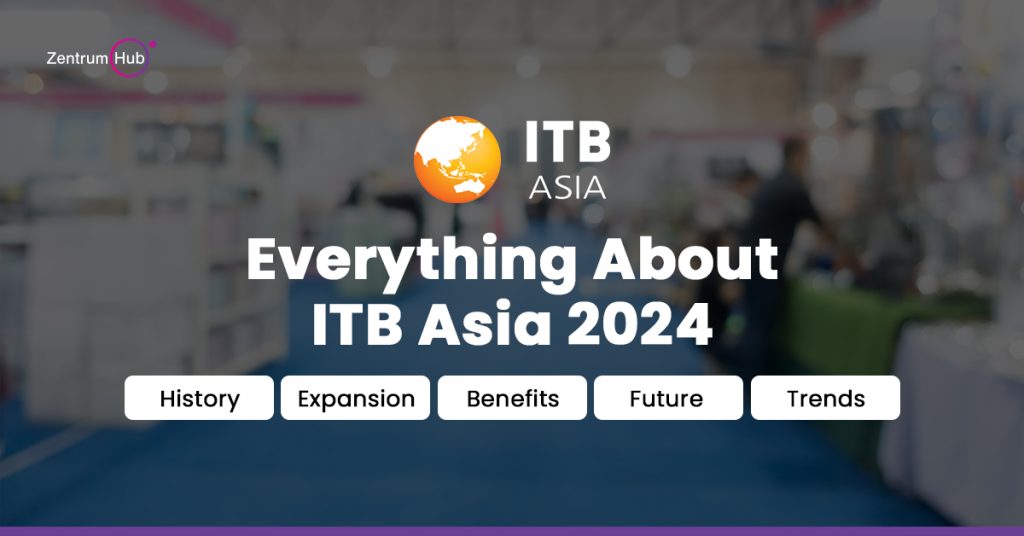
Everything You Need to Know About ITB Asia 2024 ITB Asia is a premier B2B travel trade show held annually in Singapore, bringing together global leaders in travel, tourism, and hospitality. Launched in 2008 by Messe Berlin, it has grown into a hub for business networking, showcasing the latest trends, and fostering partnerships. Attendees include exhibitors, buyers, visitors, and industry experts, with specialized segments like Travel Tech Asia and MICE Show Asia. The 2024 edition, held from 23rd to 25th October at Marina Bay Sands, promises insightful seminars, exhibitions, and exclusive networking opportunities, making it a must-attend event for professionals in the travel industry. ITB Asia has become one of the leading travel trade shows in Asia, bringing together a diverse group of professionals from the travel, tourism, and hospitality sectors. Organized annually, it serves as a platform for connecting various stakeholders, including exhibitors, buyers, visitors, and industry experts. Whether you are an exhibitor looking for new business prospects, a visitor seeking to explore the latest travel trends, or an industry professional looking to network, ITB Asia is the event for you. This blog will provide a comprehensive overview of ITB Asia, covering essential details about its exhibitors, visitors, and event duration, as well as its relevance in the travel industry. Let’s dive into everything you need to know about this dynamic event. What is ITB Asia? ITB Asia is an annual B2B trade show and convention for the travel industry, organized by Messe Berlin (Singapore) Pte Ltd. It is part of the global ITB brand, with other similar events taking place in Berlin, China, and India. First launched in 2008, ITB Asia has since grown into a prestigious event that brings together global leaders in the travel, tourism, and hospitality industries. The event focuses on fostering business relations, showcasing new travel trends, and providing a platform for buyers and exhibitors to engage in meaningful discussions. This is where industry professionals can exchange knowledge, network, and discuss the future of the travel sector. For more information about the event’s background, visit About ITB Asia. A Brief History of ITB Asia ITB Asia was first launched in 2008 by Messe Berlin (Singapore) Pte Ltd, a subsidiary of the German-based company behind the iconic ITB Berlin, which has been a cornerstone of the global travel industry since 1966. Recognizing the importance of the Asian market, Messe Berlin sought to replicate the success of ITB Berlin by creating a similar platform tailored to the needs of the rapidly growing Asian travel and tourism sector. The Birth of ITB Asia The inaugural ITB Asia took place in Singapore in 2008, a strategic location chosen for its role as a global business hub and gateway to Asia. The event aimed to provide a comprehensive marketplace for travel and tourism professionals in Asia, much like its European counterpart. Over 6,000 attendees from around the world participated in its debut year, including exhibitors from 50 countries, signaling the high level of interest in a B2B trade show focused on the Asian travel market. Key Milestones Over the Years Since its launch, ITB Asia has continued to grow, evolving into one of the most significant trade shows for the Asian travel market. Some notable milestones include: 2009–2013: ITB Asia gained momentum in its early years, quickly establishing itself as a major event on the global travel calendar. The event consistently attracted more exhibitors, buyers, and visitors, reflecting the fast-growing travel and tourism industries in Asia. 2014–2018: During this period, ITB Asia cemented its reputation as a critical hub for networking and deal-making in the travel sector.The event began to incorporate more specialized segments, including travel technology and the MICE industry, to cater to the changing needs of the market. 2019: ITB Asia celebrated its 12th anniversary, breaking attendance records with over 13,000 attendees and 1,300 exhibitors.The event saw increased participation from emerging markets and sectors such as travel tech and corporate travel, further strengthening its position as a vital industry platform. The Pandemic Challenge: The COVID-19 pandemic posed significant challenges for global travel events, and ITB Asia was no exception.In 2020, the event was held virtually for the first time, successfully bringing together participants through online platforms and ensuring that the travel industry could continue to connect, even in the face of unprecedented disruptions. Post-Pandemic Growth: With the resumption of in-person events, ITB Asia returned in 2022 with a hybrid format that combined physical attendance and virtual elements.This approach allowed for broader participation, enabling industry professionals from around the world to engage with the event even if they were unable to travel. The success of this hybrid model has continued into subsequent years. Global Expansion of the ITB Brand In addition to ITB Asia, Messe Berlin has expanded the ITB brand into other regions, including: ITB Berlin: The original and flagship event that has been held annually since 1966. It remains the largest travel trade show globally. ITB China: Launched in 2017, ITB China focuses on the growing Chinese travel market, serving as a platform for Chinese buyers and international exhibitors. ITB India: First launched in 2021, this event targets the Indian travel market, a rapidly growing segment with huge potential. ITB Asia stands as one of the most prominent global travel trade shows under the ITB banner, offering a gateway to the dynamic and diverse Asian travel market. It serves not only as a marketplace for Asian travel companies but also as a bridge connecting global companies with Asian buyers and suppliers. The Importance of ITB Asia in the Global Travel Industry ITB Asia has continued to grow in importance, driven by the massive expansion of the Asian travel market. The region is home to some of the world’s fastest-growing economies, and as middle-class populations expand, so does the demand for leisure, business, and MICE travel. ITB Asia has played a vital role in shaping this growth by providing a venue where industry professionals can come together to share insights, form partnerships, and explore new business
Hotel API Integration: Costs, Benefits, Technical Requirements
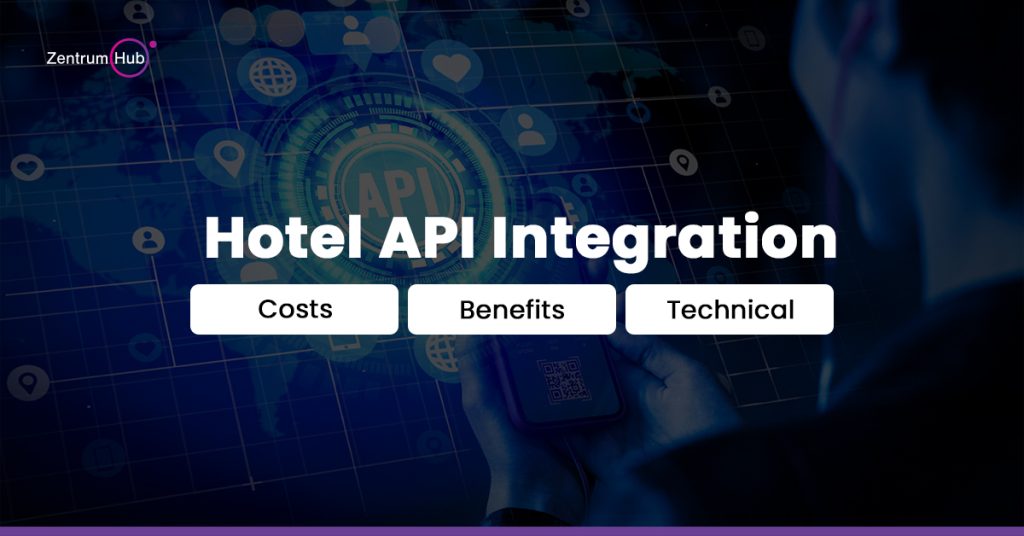
Complete Guide to Hotel API Integration: Costs, Benefits, Technical Requirements, and Best Practices Online Travel Agencies (OTAs) face several challenges in a competitive market. Price competition pressures OTAs to offer low prices, reducing profit margins. Managing real-time inventory, high customer acquisition costs, and ensuring secure payments add further complexity. Retaining customers is difficult due to low brand loyalty, while seamless integration with suppliers requires sophisticated technology. Additionally, OTAs must handle frequent cancellations, keep pace with technological advancements, and navigate global expansion challenges like localization. Finally, delivering personalized user experiences at a scale remains crucial but difficult. Overcoming these challenges requires innovative solutions, advanced technology, and strategic supplier partnerships to remain competitive and profitable. With competition intensifying, OTAs must offer users a smooth experience. One crucial aspect of ensuring smooth operations and maximizing customer satisfaction is hotel API integration. In this guide, we explore how hotel APIs work, their benefits, technical considerations, and the overall impact they can have on an OTA’s performance. What is Hotel API Integration, and How Does It Work? Hotel API integration is a technology that connects OTAs (Online Travel Agencies) with hotel databases, allowing real-time access to hotel inventory, pricing, and availability. Imagine you’re running an OTA like Booking.com or Expedia. When users search for hotels, they want real-time data on availability, pricing, and room types. Without API integration, it would be impossible to access this information from thousands of hotels around the globe. Hotel APIs bridge this gap by allowing OTAs to interact directly with hotel management systems (PMS – Property Management Systems), central reservation systems (CRS), or global distribution systems (GDS). These systems provide live updates on room availability and pricing, enabling users to make bookings in real-time. This strong connection eliminates manual processes and the need to constantly update hotel data, thus streamlining the booking process. How It Works: Request: The OTA sends a request to the hotel’s API, such as a search query for available rooms on a specific date. Response: The API responds with available options, rates, and room types directly from the hotel’s database. Booking: If a user selects a room and proceeds to book, the API reserves the room, deducting availability in real-time. Confirmation: Upon the completion of the booking, OTA and hotel receive confirmation with each detail. Real-World Example: Take Agoda, a popular OTA. When a traveler searches for a hotel in New York, Agoda uses hotel APIs to fetch real-time inventory from hotel databases, ensuring the traveler gets accurate prices and availability. The booking is completed without Agoda needing to manage the inventory directly, which simplifies the operational process. What Are the Benefits of Integrating a Hotel API for My OTA? Hotel API integration offers OTAs a plethora of benefits that extend beyond simply accessing hotel data. Here are some key advantages: Access to a Vast Range of Hotels APIs connect OTAs to multiple sources, including PMS, CRS, and GDS, which means you can offer your customers a wide variety of hotel options, from budget to luxury stays, in numerous locations worldwide. Real-Time Availability and Pricing By integrating with hotel APIs, your OTA can provide up-to-the-minute availability and pricing information. This ensures that users always see the most accurate data, reducing issues such as overbooking or pricing discrepancies. Streamlined Operations API integration automates the process, which significantly reduces the need for human intervention and minimizes errors. Improved User Experience Real-time data, easybookings, and personalized options lead to a smoother user experience, helping to increase customer satisfaction and retention. Better Business Insights Integrating hotel APIs allows OTAs to analyze booking trends, availability patterns, and pricing strategies in real-time. These insights can help OTAs optimize their offerings and stay competitive. How Does Hotel API Integration Improve My Booking Process? Hotel API integration directly enhances the booking process in several ways: Speed and Efficiency Hotel APIs facilitate instantaneous communication between the OTA and the hotel’s system, reducing the time it takes to search for hotels, check availability, and confirm bookings. This immediate feedback makes for a faster booking process, which is essential for today’s fast-paced consumers. Error Reduction With automated data updates, manual errors such as overbooking or inaccurate pricing are drastically reduced. APIs ensure that the information presented to users is always up to date. Enhanced User Experience When users can access accurate, real-time data, they are more likely to have a positive experience on your OTA. This straightfoward experience—from search to booking—improves overall customer satisfaction. Personalization APIs allow OTAs to offer personalized search results and recommendations, tailoring hotel options to individual users’ preferences. This personalization can lead to higher conversion rates and more satisfied customers. What Technical Requirements Are Needed for Hotel API Integration? Before diving into hotel API integration, OTAs need to consider the technical requirements for a smooth implementation. Here’s a breakdown of what you’ll need: System Compatibility Your OTA’s booking engine must be compatible with the API you plan to integrate. Most hotel APIs are designed to work with commonly used systems, but it’s essential to ensure compatibility with your existing software infrastructure, such as your content management system (CMS), payment gateway, and booking interface. API Documentation Every hotel API comes with comprehensive documentation that details how to make requests, handle responses, and manage errors. Thoroughly understanding this documentation is crucial for successful integration. Authentication and API Keys Most APIs use authentication mechanisms, such as API keys, OAuth tokens, or other security protocols. You’ll need to manage these keys carefully and ensure your system is secure. Data Parsing and Format Hotel APIs often use data formats such as JSON or XML. Ensure that your system can parse and interpret these formats correctly to display the data on your OTA. Server Capacity Because hotel APIs often send large amounts of data in real-time, your server must be robust enough to handle the incoming and outgoing requests. Ensure that your server infrastructure is scalable and capable of supporting increased traffic. How Do Hotel APIs Ensure Real-Time Data Accuracy for Availability and Rates? Real-time data accuracy is



